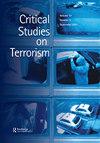The medicalisation of threats, immigration as contagion, and White supremacy in an age of terror
IF 2.5
Q2 POLITICAL SCIENCE
引用次数: 0
Abstract
ABSTRACT The 6 January 2021 events must be analysed within a broader context than the phenomenon of Trumpism. The attempted coup that brought together (former) members of the military, White supremacist organisations, and regular citizens has a rich genealogy. We trace this genealogy to the events of 11 September 2001 and the homeland security state built in their wake, even as its reach extends further into U.S. history. Post-9/11 discourse became a mechanism for seeking and interpreting perceived threats to the United States and its citizens. Through it, immigration, disease, and White supremacy became intertwined. Perceptions of infectious and biological threats became racialised. With the emergence of the novel coronavirus, President Trump enacted travel bans and routinely referred to the virus as the “Wuhan virus” or “Chinese virus.” Hate crimes against Asians and Asian Americans followed, as this language reinvigorated Orientalist histories. We examine rhetoric about disease over the past twenty years, particularly as it has reinforced militarism and White supremacy, all against the backdrop of 9/11. State constructions of 9/11 and 9/11 memory inform and explain our recent and contemporary terrain.威胁的医疗化,移民传染,以及恐怖时代的白人至上主义
2021年1月6日的事件必须在比特朗普主义现象更广泛的背景下进行分析。这场未遂政变将(前)军方成员、白人至上主义组织和普通公民聚集在一起,有着丰富的历史渊源。我们将这一谱系追溯到2001年9月11日的事件,以及在此之后建立的国土安全国家,尽管其影响范围在美国历史上进一步延伸。“9·11”后的话语成为一种寻求和解释美国及其公民所面临的威胁的机制。通过它,移民、疾病和白人至上主义交织在一起。对传染病和生物威胁的认识变得种族化。随着新型冠状病毒的出现,特朗普总统颁布了旅行禁令,并经常将这种病毒称为“武汉病毒”或“中国病毒”。随着这种语言重新激活了东方主义历史,针对亚洲人和亚裔美国人的仇恨犯罪随之而来。我们审视了过去二十年来有关疾病的言论,尤其是在9/11事件的背景下,疾病强化了军国主义和白人至上主义。9/11的国家建构和9/11记忆告知并解释了我们最近和当代的地形。
本文章由计算机程序翻译,如有差异,请以英文原文为准。
求助全文
约1分钟内获得全文
求助全文

 求助内容:
求助内容: 应助结果提醒方式:
应助结果提醒方式:


